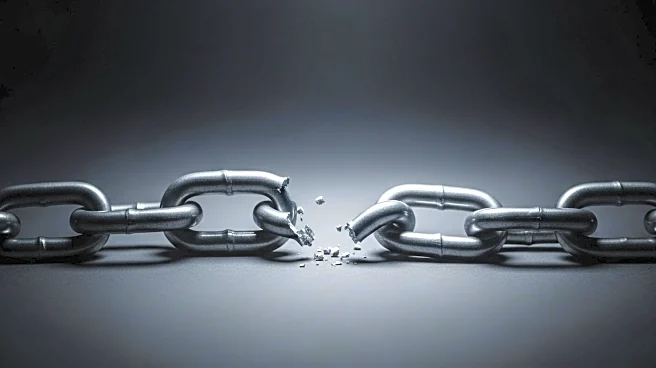What is the story about?
What's Happening?
Ineos, a chemicals company owned by billionaire Sir Jim Ratcliffe, is set to cut 60 jobs at its East Yorkshire plant in Hull. The decision is attributed to high energy costs and the influx of low-cost imports from China. The Hull site, which produces petrochemical products like acetic acid, is facing pressure from these imports, which are reportedly made using coal and emit significantly more CO2 than Ineos's operations. The company has called for the UK government and European Commission to implement tariffs to protect the industry, warning that without such measures, more sites could close, leading to further job losses. This announcement follows the closure of Ineos's Grangemouth plant in June, which resulted in 400 job losses.
Why It's Important?
The job cuts at Ineos's Hull plant highlight the challenges faced by the UK chemicals industry due to global competition and energy costs. The influx of cheaper imports from China threatens domestic production, potentially leading to deindustrialization if protective measures are not enacted. The situation underscores the need for government intervention to support local industries and prevent further job losses. The broader impact could affect the UK's economic stability and employment rates, particularly in regions reliant on manufacturing jobs. Additionally, the environmental implications of importing carbon-heavy products could undermine efforts to reduce emissions.
What's Next?
Ineos is urging the UK government and European Commission to introduce tariffs to protect the domestic chemicals industry from cheap imports. The company is also focusing on supporting affected employees and ensuring the long-term viability of the Hull site. Meanwhile, Ineos's automotive division is considering moving production to the US to avoid tariffs on European car imports. The outcome of these strategic moves and government responses will be crucial in determining the future of Ineos's operations and the broader chemicals sector in the UK.
Beyond the Headlines
The situation at Ineos reflects a larger trend of industrial challenges in Europe, where companies face competition from countries with lower production costs and less stringent environmental regulations. This raises ethical questions about balancing economic competitiveness with environmental responsibility. The potential deindustrialization could lead to a loss of skills and expertise, impacting future innovation and economic growth. The case also highlights the interconnectedness of global trade policies and their impact on local industries.















